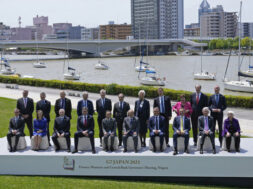
Roving Periscope: G-7 finance chiefs to warn of global uncertainty as the US debt crisis looms
Virendra Pandit
New Delhi: The USA’s current debt crisis, which could spark worldwide havoc if not resolved by May-end, may echo in the Finance Ministers and Central Bank Governors’ meeting of the prosperous Group of Seven (G-7) countries in Japan, where they are likely to warn of a global uncertainty beginning June.
Their three-day meeting, which will end on Saturday, has focused on the world economy’s challenges.
In the US, Treasury Secretary Janet Yellen said on Friday she would meet senior Wall Street bankers next week about the possibility that Washington could default on its debt for the first time since 1789.
According to media reports on Saturday, these finance chiefs are expected to warn of more global economic uncertainty in the wake of a US debt ceiling stalemate and fallout from Russia’s invasion of Ukraine.
The gathering in Niigata, Japan, is being held amid worries over a US default fueled uncertainty over the global outlook, already clouded by stubbornly high inflation and the failure of some US-based banks.
“The global economy has shown resilience against multiple shocks, including the COVID-19 pandemic, Russia’s war of aggression against Ukraine, and associated inflationary pressures,” they would say in a final draft of a communique, the media reported.
“We need to remain vigilant and stay agile and flexible in our macroeconomic policy amid heightened uncertainty about the global economic outlook.”
The communique may also mention the US debt ceiling stalemate, which hits markets at a time when borrowing costs are rising because of aggressive monetary tightening by the US and European central banks.
“Clearly, distress in the world’s biggest economy would be negative for everyone,” World Bank President David Malpass said.
“The repercussions would be bad to not get it done.”
On the banking troubles, the draft communique said policymakers would tackle “data, supervisory, and regulatory gaps in the banking system.”
G-7 is expected to continue its condemnation of Russia’s invasion of Ukraine and pledge to strengthen monitoring of cross-border transactions between Russia and other countries.
This year’s chair of G-7, Japan, is spearheading efforts to diversify supply chains and reduce their heavy reliance on China, the world’s second-biggest economy, which is among the chief concerns of economists globally.
The draft communique showed that the G-7 finance leaders might set a year-end deadline for launching a new scheme to diversify global supply chains.
It envisages the G-7 offering aid to low- and middle-income countries so that they can play a bigger role in supply chains for energy-related products, such as by refining minerals and processing manufacturing parts.
This week, US President Joe Biden warned that the American economy could slip into a recession and throw millions out of jobs unless the Opposition Republicans agree to raise the country’s USD 31.4 trillion debt ceiling before June.
If the debt ceiling is not raised and the US defaults, it may cause a global economic catastrophe.
The entire international financial system will be jolted since more than USD 500 billion in US debt gets traded every day worldwide.
According to Moody’s Analytics, if the stand-off between the legislature and the executive continues, stock prices will fall by almost a fifth and the US economy will contract more than 4 percent, causing a loss of over 7 million jobs.
Last week, White House economists estimated that a protracted default could cost up to 8 million jobs and wipe half the value off the US stock market.














